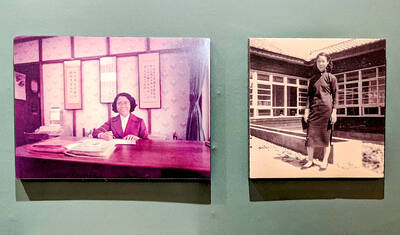Tod Wodicka has said that he began his debut novel in a spirit of satire and then let it deepen into something else. The wisdom of that approach is borne out by this tender, oddball book, one that performs a deft balancing act as it hides love, yearning and regret behind the mouthful of medieval incantation in its title.
Wodicka might have delivered little more than an extended cheap shot if he merely lampooned the desperation with which his main character, Burt Hecker, aka Eckbert Attquiet, craves the escapism of the Middle Ages. Certainly there is much humor in Burt and his quaint affectations, since he uses them so absurdly as a barrier between himself and the modern world. "Begone," Burt says, figuratively speaking, to banish what he deems the "crashing promiscuity" of his own times.
"Eckbert, you sack of pepper, how dost thou?" exclaims the so-called Sir Bob of Ghent, who is nicknamed the Bobonic Plague and shares Burt/Eckbert's sense of living history. Burt still recalls the medieval reenactors' meeting at which Sir Bob feigned the Black Death for two hours, "screaming and flailing in a historically accurate manner" until he was finally prevailed upon to die. Burt's own camouflage is less virulent and mostly involves the toga, sandals, mead, gruel and mystical chanting that he finds transformative. At first only the most drastic reality checks (as when the mead-filled Burt is arrested for drunkenly driving his lawyer's Saab, in the year that he calls AD 1996) force Burt's two worlds to collide.

But Wodicka's showily titled All Shall Be Well; and All Shall Be Well; and All Manner of Things Shall Be Well (a quotation from the 14th-century mystic Julian of Norwich) gradually exposes Burt's diversionary tactics for what they are. He has lost his wife, Kitty, to cancer. He is in the process of losing his two children to their long-simmering resentment and spite. Burt and Kitty's daughter, June, dealt with her father's medieval fetish by falling in love with Star Trek, learning to speak Vulcan and raising her son, Sammy, to dread any contact with his maternal grandfather. "Or no dessert," Burt hears June telling Sammy during a telephone call as she forces the boy to talk to his freaky old forebear.
As for Tristan, Burt and Kitty's son, he has renamed himself Tim and moved to Europe. There he has immersed himself in the folk music of the Lemko people, the Carpathian ancestors from whom Kitty is descended. "Lemko folk music should be performed in the hills to an audience of goats and clouds," Burt observes in the tone that, once you get beyond his polite reverence for all things medieval, can be caustic. "Trust me, the stuff is unpalatable to human ears."
The trajectory of the story takes Burt to Europe from upstate New York, where he and Kitty ran a Victorian inn. His ticket is one way. Though he is seemingly going to Germany to honor the 900th birthday of Hildegard von Bingen, the medieval "anchoress, theologian, visionary, naturalist and composer so adored by today's more esoterically disposed females," he has ambivalent feelings about traveling in this company. One of the pilgrims, a child named Heather, "already has a reputation as a fearsome pedant" and has been known to argue that the crown seen at Burger King is actually a ducal coronet. With his usual mordant acuity, Burt notices that Heather "punches in the sign of the cross as if emergency-dialing a telephone."
Burt intends to stay in Europe, find his lost son and settle old scores. In this regard, Wodicka's novel follows a fairly conventional structure and seems headed, even in its quirkily roundabout way, toward traditional forms of resolution. Certainly Burt will come to terms with Kitty's death. (He does so in a startlingly poignant scene that equates true love to the storming of a fortress, with Burt's commandeering a siege-tower prop to reach Kitty's bedroom.) And Burt will try to patch up his relationships with both children before the book is over.
But Wodicka succeeds in keeping this story bittersweet and unpredictable. He is not in the business of confecting happy endings; he is more drawn to Pyrrhic victories. The book's structural need to send Burt on a voyage of self-discovery does not require the light of undue sunshine. And Burt, as a man whose visit to a present-day Central European nightclub reminds him of Hieronymus Bosch and St Vitus' dance, is in no danger of succumbing to unwarranted optimism. The benediction of the title is as guardedly encouraging as this book gets.
All Shall Be Well works hard to flog the contrasts between medieval and modern life for comic purposes. Wodicka envisions the Burt of AD 1965, teaching school and trying unsuccessfully to hand out copies of the Magna Carta to his students, leading a dim workaday life that Kitty would soon brighten. He depicts the endless friction between Burt and his mother-in-law, Anna Bibko, a Lemko who is guided by her senses of traditionalism and grievance. He notes that Anna hates Burt so much that Burt has had to use the name Vaclav Havel to get her on the telephone.
Anna serves as a reminder that the words of this book's title are a hope, not a promise. Like Kitty's death, Burt's dread and his family's disintegration, Anna underscores Wodicka's suitably ancient theme: memento mori. In Burt's more artfully comic phrase, "she is a U-boat beneath us all."

Following the shock complete failure of all the recall votes against Chinese Nationalist Party (KMT) lawmakers on July 26, pan-blue supporters and the Chinese Communist Party (CCP) were giddy with victory. A notable exception was KMT Chairman Eric Chu (朱立倫), who knew better. At a press conference on July 29, he bowed deeply in gratitude to the voters and said the recalls were “not about which party won or lost, but were a great victory for the Taiwanese voters.” The entire recall process was a disaster for both the KMT and the Democratic Progressive Party (DPP). The only bright spot for

Water management is one of the most powerful forces shaping modern Taiwan’s landscapes and politics. Many of Taiwan’s township and county boundaries are defined by watersheds. The current course of the mighty Jhuoshuei River (濁水溪) was largely established by Japanese embankment building during the 1918-1923 period. Taoyuan is dotted with ponds constructed by settlers from China during the Qing period. Countless local civic actions have been driven by opposition to water projects. Last week something like 2,600mm of rain fell on southern Taiwan in seven days, peaking at over 2,800mm in Duona (多納) in Kaohsiung’s Maolin District (茂林), according to

Aug. 11 to Aug. 17 Those who never heard of architect Hsiu Tse-lan (修澤蘭) must have seen her work — on the reverse of the NT$100 bill is the Yangmingshan Zhongshan Hall (陽明山中山樓). Then-president Chiang Kai-shek (蔣介石) reportedly hand-picked her for the job and gave her just 13 months to complete it in time for the centennial of Republic of China founder Sun Yat-sen’s birth on Nov. 12, 1966. Another landmark project is Garden City (花園新城) in New Taipei City’s Sindian District (新店) — Taiwan’s first mountainside planned community, which Hsiu initiated in 1968. She was involved in every stage, from selecting

As last month dawned, the Democratic Progressive Party (DPP) was in a good position. The recall campaigns had strong momentum, polling showed many Chinese Nationalist Party (KMT) lawmakers at risk of recall and even the KMT was bracing for losing seats while facing a tsunami of voter fraud investigations. Polling pointed to some of the recalls being a lock for victory. Though in most districts the majority was against recalling their lawmaker, among voters “definitely” planning to vote, there were double-digit margins in favor of recall in at least five districts, with three districts near or above 20 percent in